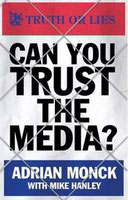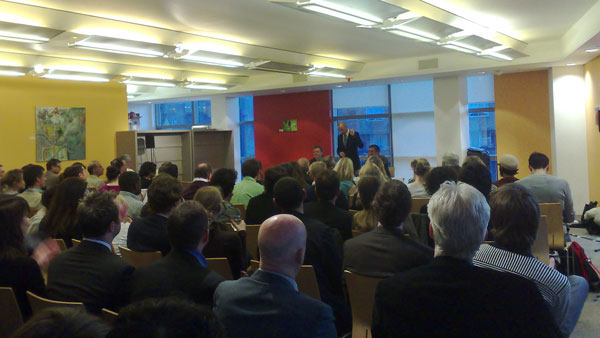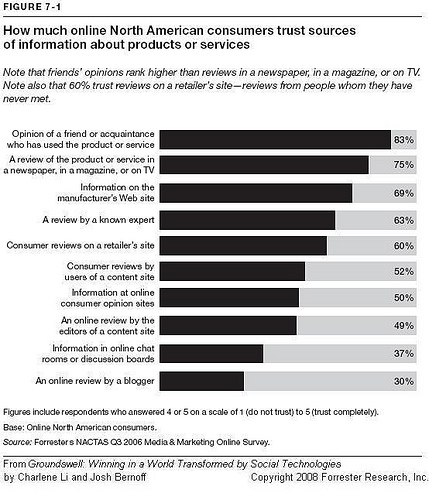"Can you trust a media blogger?"
A couple of weeks ago I went to the launch of Adrian Monck's "Can You Trust The Media?" and I wrote up an account of it for my blog. That somewhat begged the question: "Can you trust a media blogger?".

Reviews of the book have appeared in The Observer, The Guardian and on the blog of Charlie Beckett. Obviously, as these have been sanctioned by the 'great-and-good' of mainstream media these are valid reviews. But what about my account of the evening? How much store can you put in that?
I ask the question because in the same week I was reading of a study about whether the public 'trust' bloggers. American surveys firmly came up with the answer 'no'.
A response piece by Joshua Porter argued that this was entirely the wrong question. Of course people don't trust an amorphous mass of anonymous 'bloggers', but they do trust people they know who blog. This is an important distinction, because they are not mutually exclusive groups.
It is my assumption - possible incorrect - that regular readers here will have 'trusted' my account to be a reasonable representation of the event. That, though, is entirely divorced from whether this site is a news site, or a blog, or uses Wordpress or Blogger or Movable Type or Vignette or Documentum or Drupal as the content management system underneath it. And it also doesn't depend on whether I am a 'journalist' or not.
Sure, in writing the blog post, I did some journalist-type things.
I might not have an intranet with a database of important forthcoming events at my disposal like people within the BBC do, but I read widely in my 'niche' so I knew the event was going on. I came armed with my multi-skilled reporting tools - a notebook, a laptop and a Nokia N95 camera-phone. I sat and listened and took notes and pictures, and jotted pithy quotes down verbatim.

Then I sat down and worked out what I was going to write. I had a deadline. I knew from my publishing schedule that I needed the article to be ready for the Friday morning two days after the event. I couldn't publish it the very next day, as I like to stick to one article a day, and the Thursday slot was already reserved for my article about the anniversary of spam.
The 'spam mail' post itself had been carefully scheduled for impact - choosing the earliest possible interpretation of the anniversary date (when the email was written, not sent) so that it didn't just look like a 'me too' blog re-post of something already covered in the mainstream tech media.
I went through my notes from the Adrian Monck book launch, selected the bits that I thought gave the best flavour of the evening, and concentrated on one of the items that interested me - Andrew Gilligan's comments on the London Mayoral Election.
But none of those alone are reasons why someone would 'trust' my account of the evening. That 'trust' isn't earned because the blog is written by a name journalist or a mainstream media publisher. It is because it becomes a relationship. It isn't the same type of relationship that I have with people in a one-to-one situation, even though a lot of the subscribers here are people I know. And it certainly isn't the same type of traditional relationship between broadcaster and audience that has existed in the one-to-many model.
I think a lot of the struggle traditional media people have in understanding new media and the developments it allows is because we don't yet have a grasp on how to articulate these new 'one-to-some' relationships.
I have a bunch of subscribers and regular visitors who get a chance to read what I write every day. Not because it is always good, interesting, advertised, or even necessarily on-topic, but because they have developed over time a relationship with me and the currybetdotnet site.
In many ways it can be a stronger relationship than the one an audience has with a broadcast or print media figure, because the chances are if you email me or leave a comment, I will reply. The 'one-to-some' relationship in reverse is manageable, in a way that personally replying to every viewer, listener or reader isn't possible for the mainstream media.
And that builds trust.
We see over and again people comparing 'bloggers' to 'journalists', and making the mistake of thinking that one is the other, that one wants to be the other, and that one can be better and more worthy than the other. Tomorrow I'll be questioning the assumption by many nay-saying journalists that all bloggers somehow want to be journalists and do journalism.

"[W]hat about my account of the evening? How much store can you put in that?"
Well, I didn't actually see you there ;)
That is true actually, I did tell you I wasn't going to be able to make it didn't I?
In my own case, I'm only reading this because you're in James Cridland's aggregated feed of 'BBC staff'.
We've never met, and this is the first time (as I recall) that I've ever visited your site directly. So to an extent, what trust I have in you is indeed earned by being 'published' by a named publisher... namely, James.
In that respect, it's no different to being a columnist in a newspaper. An editor has chosen your views as being worth carrying in his selection of quality material. Just not in print. And money presumably doesn't change hands.
So whilst I wholeheartedly agree with your point about the development of new relationships, that isn't to say the old approaches have died. And in a world of RSS feeds and content sharing, they can surface unexpectedly.
Thanks for popping over Simon - and thanks to James for introducing me to you! I hadn't given much thought to the places where the content gets 'syndicated' out via RSS.
Hi Martin,
That's a very insightful and stimulating post. But I don't know why you are still so obsessed with the distinction between 'old' and 'new' media or 'real' journalits and bloggers. You certainly put a lot more journalistic effort into your article about Adrian's book launch than I did mine. And probably more than someone who reviewed the book in a newspaper. You certainly did it differently, too, because as you say, your readers expect different things from you.
Trust is, as Adrian writes, a chimera or a code-word for other real issues. People don't need to 'trust' any media source. I would hope they would be sceptical of all of them. Instead, what will work in the new media environment will be integrity based on a real two-way relationship. Whether it's your blog or the New York Times, journalism is turning into a process not a product. And it's a process that the public will judge on its value to them.
Cheers
Charlie
The 'trust relationship', or just plain relationship, between a journalist and his or her audience and a blogger and his or her audience is different though Charlie. It's something I think about quite a bit since I operate in both spheres. I'd probably trust a media blogger more than I'd trust a general news reporter because the blogger has a face: you get to get aquainted with this person and judge his or her credibility over time, and he or she is usually open about sources, biases and mistakes. Indeed, that relationship, getting to 'know' someone thru their blog is a peculiar thing because you end up 'knowing' all these people you've never actually yet, and still, to some extent, you feel you know them and will take their recommendations over an ad any old day....
I agree, a blogger is far less restricted by politics or his/her boss. This is one of the big advantages of the internet, it grants everyone free speech. Blogging is a more casual version of reportage, which can become more and more formal as time goes on and the author gains a reputation (good or bad, both could yield rewards for the author).
The average blogger should still be careful, you cant say what you like in places like China etc. If your blog touches on sensitive topics you should be sensitive to other peoples feelings and take a more formal approach, leaving out some or all of your personal emotions. These days people are suing because they trip over their own shoe laces, so bloggers should be careful.
Now the government wants to track every email everyone sends in the UK. Will only be a matter of time until bloggers start taking flack.